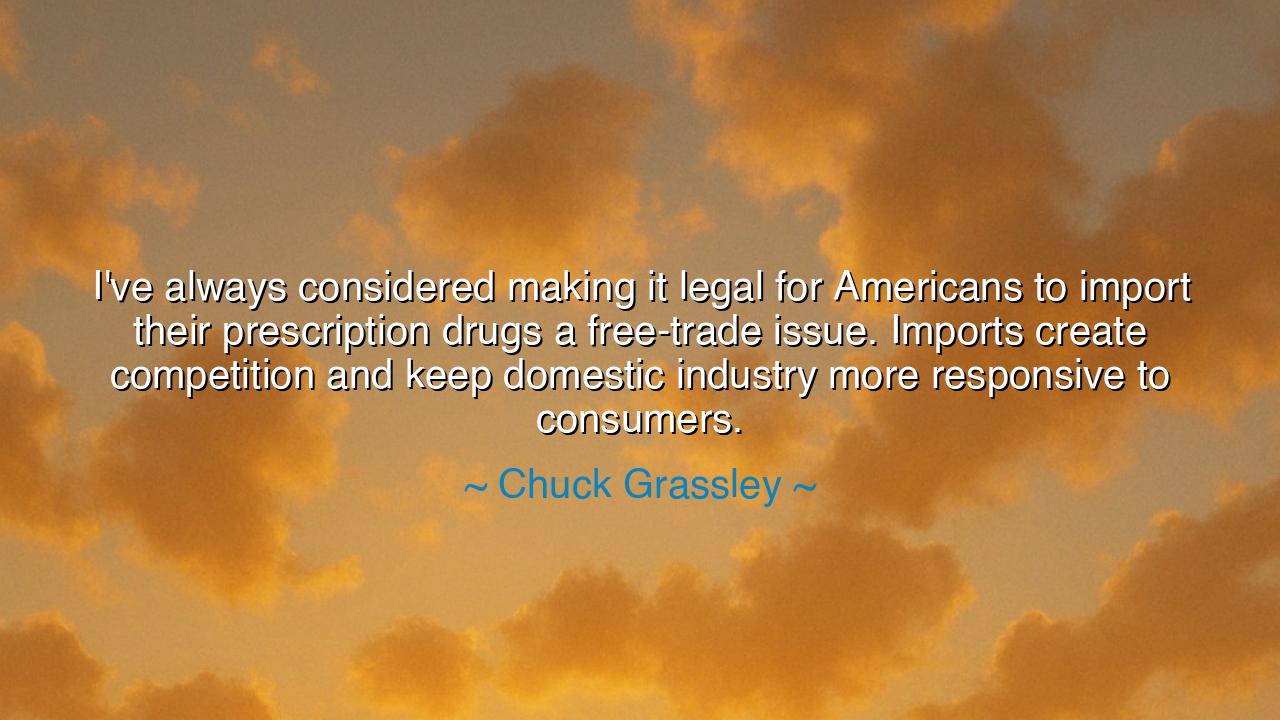
I've always considered making it legal for Americans to import
I've always considered making it legal for Americans to import their prescription drugs a free-trade issue. Imports create competition and keep domestic industry more responsive to consumers.






In the words of Chuck Grassley: “I’ve always considered making it legal for Americans to import their prescription drugs a free-trade issue. Imports create competition and keep domestic industry more responsive to consumers.” These words are more than a statement on economics—they are a call to justice and balance. They recognize that when powerful industries grow unchallenged, they forget the people they are meant to serve. By opening the gates to imports, Grassley calls upon the ancient wisdom that true fairness is born when no single power may dominate unchecked, and when the many have choice against the few.
The ancients often spoke of markets as living things. In the agora of Athens, the voices of many sellers kept the price of goods in balance, for no one merchant could demand more than the others would allow. But when monopoly arises, when the stall of one trader overshadows all, then greed takes root, and the common man suffers. Grassley warns against such a fate: without the discipline of competition, the cost of prescription drugs rises, and those most in need—the sick, the poor, the elderly—pay the highest price.
History offers us examples. In medieval Europe, guilds often controlled entire industries. They began as protectors of craft, but over time, their monopoly suffocated innovation and drove prices high. Only when trade routes opened—when new goods from distant lands arrived—did the monopoly weaken, and the people once again gained access to affordable wares. So too today, Grassley argues, imports can pierce the shield of the pharmaceutical giants, reminding them that they do not rule by divine right, but by the service they render to the people.
The mention of free trade is no accident. For centuries, nations waged war over the right to control markets. Yet the great flourishing of modern economies came when barriers fell, and goods flowed across borders. The American Revolution itself carried the spirit of resisting monopoly, for the colonists raged not only at taxation but at the East India Company’s stranglehold on commerce. Grassley’s words echo this heritage: to allow imports is to continue the old struggle against concentrated power, ensuring that no industry may grow so bloated as to forget the people it serves.
Yet his words carry also a moral weight. It is not only about economics, but about compassion. For prescription drugs are not luxuries—they are lifelines. To deny the people access to affordable medicine is not a matter of market convenience, but of human suffering. The ancients said that the first duty of rulers is to protect the weak, for the strong can protect themselves. By framing drug importation as both free-trade and justice, Grassley reminds us that economic fairness and human dignity are bound together.
The deeper meaning of this quote is that liberty in trade is not an end in itself, but a means to safeguard the wellbeing of the people. A closed system grows arrogant; an open one remains humble and responsive. When industries know that citizens may look beyond their borders, they are compelled to treat them with fairness. Without such pressure, the scales tilt, and the many are crushed beneath the weight of the few.
So let this teaching endure: defend competition not for its own sake, but because it keeps the mighty accountable and gives the weak a fair chance. In your own life, remember to seek balance where power grows unchecked. Support choices that keep systems open, transparent, and just. For as Grassley’s words remind us, imports are not merely a matter of trade—they are a shield for the people, a reminder that freedom is preserved not when the strong rule alone, but when all may choose, and in choosing, keep power humble.






AAdministratorAdministrator
Welcome, honored guests. Please leave a comment, we will respond soon